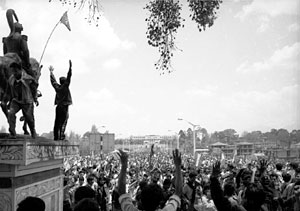 MIN RATNA BAJRACHARYA |
Paras Shah's revelations in a Singapore tabloid will have to pass the test of time before his version of the Narayanhiti Massacre is accepted. But his assertion that King Dipendra wasn't happy with the restoration of multi-party democracy in 1990 has been known before. In the aftermath of the Referendum in 1980, then-prince Gyanendra and his nephew were unhappy with Birendra for having capitulated to street protests. They were even more furious when he backed down from a coup that the royal family had planned in 2000.
Incorrigible royalist Tulsi Giri chose self-exile and returned to Kathmandu only in 2005 when Gyanendra as king began resurrecting his father's autocracy. He soon became the principal ideologue and loyal deputy of the Chief Executive of the royal-military regime.
During election rallies preceding the plebiscite in 1980, Giri had proudly proclaimed that he was ready to wear a sari and blouse if the king ordered him to do so. Such a public display of loyalty to royalty earned Giri the sobriquet of 'Mother of Panchayat'.
UML nominees in the coalition have their own reasons to forget the lessons of referendum: they were complicit in the conspiracy of defeating democracy by boycotting the historic plebiscite. MJF supremo Upendra Yadav also spent his formative years learning disruptive techniques of 'underground' politics from the likes of Jhalnath Khanal and Bamdev Gautam.
Pushpa Kamal Dahal has claimed that he voted blue in the referendum. but that's an indirect way of admitting that he didn't do much else. The majority of today's Maoists were not even born when the power of banners and not bullets shook the country 30 years ago.
The NC, which took the lead in the 6 April 1979 Student Uprising, should have proclaimed it the 'National Day of Youth'.
But its geriatric leadership makes sure that nobody below 50 gets any role or responsibility in the party hierarchy. Issues that can energise Nepal's youth are intentionally ignored. It's almost by default that student fronts of left-wing parties dominate university campuses - the NC-affiliate NSU has lost the will to compete.
A collective amnesia envelopes events that led to the declaration of referendum. Few remember that had students all over the country not erupted in protests against the conspiratorial hanging of Pakistan's prime minister Zulfikar Ali Bhutto, a similar fate could easily have been engineered for BP Koirala. Like Pakistan, Nepal also was an arena where proxies of global powers engaged in gladiatorial contests.
King Birendra knew the rules of the game and provided BP with the face-saving device of the referendum. But apparently, even he didn't know enough to save his own family from the wrath of history.
The problem with monarchs, military dictators and revolutionaries is that they have too much faith in their ability to calculate the consequences of their actions. Pakistan and Nepal, through our intertwined histories, are examples of what happens when political forces try to micromanage history.
Which is why the Maoist leadership should learn the lesson of history from 1979. The Maoists should see the long-term benefits of giving a democratic space to everyone, including political parties with feudal and regressive sympathies. You can shape destiny, but you can't control it.



